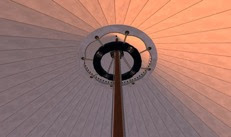If there was one thing Henry Meiggs could do, it was construction. Everywhere Meiggs went, he was responsible for incredible commercial construction projects, many of which are still standing. Unfortunately, after the construction was completed, Meiggs never proved capable of successfully running any of those enterprises he had created.
Born in 1811, Meiggs’ first company was a lumber business in New York City, where he found that his lack of political connections meant he would be unsuccessful in securing government contracts. Eager to move his business to an area not quite so settled, Meiggs loaded his inventory of lumber onto a ship and sailed into San Francisco Harbor just at the peak of the Gold Rush.
Gold fever and the stampede of would-be miners had skyrocketed the price of everything, and though California had a seemingly endless supply of timber, there was a critical shortage of men willing to work in the forest for wages while others were getting rich in the gold fields. Meiggs was able to sell his lumber for twenty times what he had paid for it, providing more than enough funds to start several businesses.

Unfortunately, the new pier was slow to return the cost of construction and Meiggs, facing bankruptcy, sold fraudulent city warrants (think of them as bonds) that he obtained from his brother, the newly elected city comptroller, raising somewhere between $8,000 and $500,000—the amount varies depending on whether you believe the city or Meiggs. By the time the fraud was discovered, Meiggs and his family—including his brother—had hastily boarded a south-bound ship and had escaped to Chile.
After arriving in Chile, Meiggs tried to start a business and was unsuccessful, losing all of the money he had brought from San Francisco. Impoverished to the point that he had to pawn his pocket watch to eat, Meiggs once again started a new business. Despite having no experience whatsoever in the field, Henry Meiggs started building railroads across Chile and Peru, where the mountainous terrain makes such construction all but impossible.
Depending on the terrain, Meiggs used four different railroad gauges, dug long tunnels, bridged enormous ravines, and built railroads connecting mining districts to Pacific ports, after British engineers had said the job was impossible. In Peru, he laid tracks from Lima to Altiplano, 14,000 feet above sea level, to build what is still the highest railroad line in the Americas. Still operating today, the train carries oxygen tanks for its passengers, who frequently suffer from hypoxia.
Once again, Meiggs built a personal fortune, using part of his new wealth to completely refund the victims of his San Francisco fraud. After extensive lobbying, the California State Legislature passed a peculiar law—one making it illegal to prosecute Meiggs for his swindle. Though the legislature approved the measure—one can only imagine what that cost in bribes—the governor vetoed the bill.
For years, Henry Meiggs was the unofficial dictator of Chile, using the railroads to control what the country exported, but while the railroads were profitable for Meiggs, the cost of maintaining them impoverished the nations where he had built them. Since Meiggs was generous with the right government officials, neither Peru nor Chile tried very hard to correct the situation.
Note. In 1857, President Buchanan appointed John Bigler as the U.S. Minister to Chile. Bigler did not execute the job very well, as he was all but ignored by the Chilean government. This is strange since Bigler had previously enjoyed a distinguished political career, having served as the Governor of California.
Meiggs expanded his railroad empire and had signed a contract to build a new railroad line in Costa Rica, when he died in 1877. The railroad business and the new contract for the railroad in Costa Rica passed to Meiggs’ nephew, Minor C. Keith, who not only finished the line, but used the profits to invest in agriculture. Because banana plants soak up an amazing amount of ground water and can help stabilize low-lying areas, Keith experimented with growing bananas on land bordering the railroad tracks, using his trains to quickly ship the fruit to the docks where steamboats could race the ripening bananas back to New Orleans for sale. Slowly, this sideline agricultural business began to make a profit.
Over the years, that small company slowly grew into the infamous United Fruit Company that controlled large areas of Central America for decades. Today, the company is known as Chiquita Bananas. (Well, actually, the company is called Chiquita Brands, but the company changes its name so frequently in hopes of outrunning its past, that it has probably changed again in the last hour or two.)
I guess I should tie up the rest of the loose ends here. Although railroads all over Central and South America are being abandoned and shut down due to government neglect and siphoning off of profits instead of maintenance of the lines, the railroads created by Meiggs and Keith are still largely functioning.
Henry Meiggs can no longer be called an embezzler. In 1977, one hundred years after Meiggs’ death, Judge Harry Low of the California Superior Court quashed the 123-year-old indictment on the grounds that the railroad mogul had not only rehabilitated himself, but had taken the case to a higher court. (Seriously, that’s what he put in the court records.)
So…. The next time you are eating a banana, you can reflect on the fact that you have that fruit because a San Francisco embezzler couldn‘t sell lumber in New York, which led to his nephew becoming worried about flooding in Costa Rica.








